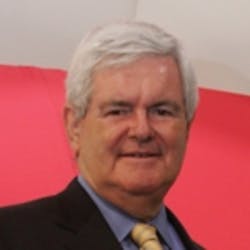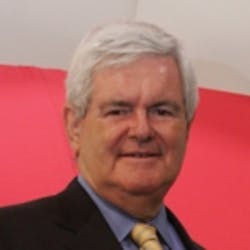AG: The Center for Studying Health System Change released a study which talked about the difficulties in getting collaboration among competitors involved in regional health information exchanges. How do you think that dynamic will play out?
NG: This involves thinking about how we have historically viewed, for example, doctor conversations, which in some ways have come under antitrust restrictions. In the airline industry, we’ve been pretty successful with distinguishing non-competitive conversations from competitive conversations, so that airlines and aircraft manufacturers can all get in the same room for the purpose of discussing results of a crash or lessons to be learned or how to change the system, but they can’t get in the same room to talk about scheduling or pricing. And I think we ought to have the same thing in healthcare, and it may require a federal law change. There ought to be a safe harbor created that enables doctors and hospitals and technology companies to talk with each other openly in a non-antitrust environment if the purpose of the conversation is the flow of information as it relates to patient outcome and patient safety. I think that that requires some monitoring, but I think the current rules actually increase the number of people who die unnecessarily annually and increase the number of people who get sick unnecessarily annually, because it inhibits the flow of information and the flow of resources.
Second, one of our biggest concerns with these regional health initiatives is how do you find a stream of revenue to sustain it? It’s fairly easy to get a one-time federal grant and have three or four years of interesting discussions, but unless you have an ongoing stream of revenue, you can’t last. If you look at ATMs — there was one in my hotel last night, and it said it would cost me $2.60, and I can either use it or not use it, it was my choice. But the fact is the ATM is sitting there because they charge money for it. And so you have a worldwide banking system that gives you real-time access to cash in about 120 countries because there is some underlying transaction fee that sustains it. We have to find a similar pattern. The closest that I’ve seen to sustainable was the insight that Humana and Blue Cross/Blue Shield of Florida had when they created Availity. Because they figured out that if they could take out the paper transaction cost of clerically evaluating the individual patient’s eligibility and shift it to an Internet-based expert-system mediated structure, so that 99 percent of all eligibility decisions are routine and automatic and don’t require a person to intervene, they save, I think, 23 stories of an office building in clerical help. That’s a recurring annual savings every year. That amount of money enabled them to give technically 95 percent of the doctors and 100 percent of the hospitals in Florida computers. Availity now is probably the most widely wired capacity — it’s eligibility oriented.
I think one of the things that’s going to happen with the modification of Stark is that you're going to see sole practitioners all of a sudden with an opportunity to have a service provider sustained by the hospital. The hospital is going to have substantial savings in paperwork, in accuracy and speed in coordinating with the doctors, particularly on the discharge patient side. You're going to be able to have follow-up information and follow-up treatments stunningly more accurate and stunningly more efficient than the current system.
My hunch is that that’s going to lead to a very substantial increase in sole practitioner and small practice doctors being on electronic medical records, because what you can't do is you can't have small systems with their own internal IT. It’s so inefficient and the quality of person you can hire is not sufficient, because you need a really high accuracy system for healthcare. It’s one thing if my personal computer goes down, it’s another thing if the computer that has all my data for my health goes down while I’m sitting in the emergency room. So I think going to these service provider models, where somebody has orchestrated for a region or for an entire county, access to a high quality health record system and the technical maintenance system that sustains those, I think is probably the model that’s going to emerge.
AG: Partners Healthcare has mandated their affiliated docs get on an EMR. Other health systems are taking a softer approach. Which do you think will be most successful?
NG: Let me use a common sense example. If a doctor showed up who said, ‘I’m not sure I believe in cell phones. I don’t personally like using the telephone very much, but I think if you’ll use a messenger service, I’ll be glad to be part of your network.’ They’d find it really hard to get anybody to associate with them, because we haven't had messenger systems since about 1890. So we now stipulate the doctor is going to have a telephone. It’s not as much discussed who’s going to pay for it, but how do you open a doctor’s office without a telephone?
Similarly, you are presently going to see — in a very real sense, I think Partners is a forerunner — almost everywhere a steady migration towards. If you look at a number of big systems that employ doctors directly, all of those are going to migrate to require electronic health record systems. Then you're going to see the hospitals begin to see there is a benefit to using it. Finally, you're going to see systems say you have to use it.
You’ll notice that Secretary Levitt said recently he thought by 2011 Medicare should actually require electronic prescribing. He is sending out a signal that we’re on a path to electronic prescribing and that every doctor in the country — if they still plan to be in Medicare in 2011 — should plan to be electronically prescribing. And you can argue about how fast we can make that migration. But it tells you that a paperless — this is why we wrote “Paper Kills” — electronically mediated information system is going to become a universal certainly within the next decade.
AG: Some say the industry is waiting for the outcome of the presidential election before spending and activity will really pick up again. What are your thoughts?
NG: I think that’s almost an every four year cycle, particularly because this is the most open election that we’ve seen in modern times, because you have no incumbent president, no incumbent vice president in either party. So the excuse to say, ‘I think I’ll wait and see what's going to happen,’ becomes very powerful.
My argument though is very different. I view history as being like a giant river, and the river is slowing in a certain direction. So if you look at the last 100 years, it has flowed more towards internal combustion engines, flowed more towards computing and flowed more towards wireless. So if, as a general prediction, I say to you 20 years from now, wireless will be ubiquitous, computing will be ubiquitous, the scale of databases will be unbelievable, and the speed and complexity of analysis will be unbelievable, and 99.99 percent of it will be invisible. You won’t notice it, just as you have no idea how many computers there are in your car, nor do you care. So what's happening is those people in health who make the decision to invest in information technology and modify their culture and their work processes to become part of the future will have a substantial advantage over those who are late adopters. I think that you’ll see this happening again and again.
We live in a country where one of the highest valued stocks is Google. Google didn’t exist 20 years ago. Go down the list, Microsoft didn’t exist 30 years ago. All these systems are out there today that didn’t exist. So to suggest that this could be a passing fad, I think is just a denial of reality.
AG: Do you think the key to improving our system is lining up financial incentives with better long-term health management, not just treating the sick?
NG: We have a member meeting next week — the Center for Health Transformation collocated with the American Medical Group Association. The American Medical Group Association has one of the most exciting experiments underway in the country today, because they're trying to really rethink the totality of how we pay for healthcare from two very different angles. The first is, if I have a population that I keep so healthy that they never need to come to my hospital, how do I sustain my hospital? I just managed to make sure that you didn’t get diabetes and so you're not going to need kidney dialysis and so you're not going to show up. So I did a wonderful thing for the society and I just bankrupted myself.
The second is they have an actual case study in Seattle of a medical group which sent 50 doctors to study Toyota and took so much waste out of the system that they almost went broke. It turned out that the waste had transaction fees. So if I don’t need to do X because, in fact, my system is so good — I don’t have to repeat labs three times. I suddenly lost so much revenue that it’s hard to keep my door open.
One thing you're going to see happen is a realignment of what the incentives are and what we’re paying for. This has been a big problem because people say over and over again, ‘Wait a second, if I go to an electronic system, I may save the insurance company money, or I may save the state of Georgia money, or I may save the federal government money, but how did it save me money?’ That’s a big component.
So you have this new outlook — first, if I go to an electronic system, and I eliminate waste in the model, how do I get compensated. Second, if I shift to prevention, wellness and only testing, how do I get compensated? Those are both huge intellectual transitions. One of the things that we’re working on at the center is literally how do you build these models. If Congress held hearings next week, there are no effective models we can turn to right now to give us a really good sense of how do you align market forces with values and with technological capabilities.
AG: Who would you say a passionate healthcare CIO should vote for? Who would represent their perspective the best?
NG: I have a very partisan role in my personal life as a former Speaker of the House, but at the Center for Health Transformation, we are very bipartisan. On health issues, I’m not going to tell people who to vote for. I mean obviously, to be clear, I’m for John McCain because that’s the Republican nominee. But I’m not going to make a health policy argument on this thing.
AG: Could you evaluate their positions in any way on healthcare IT?
NG: First of all, we worked with Hilary Clinton a good bit on the healthcare IT. We’ve actually had a surprisingly good relationship with Senator Clinton, with Senator John Kerry, with Congressman Patrick Kennedy. There are a lot of Democrats we find get a good bit of this. I think we’ve made progress on a bipartisan basis. We have not worked with Senator Obama on these issues, so I can’t comment on that.
My hunch is that on the issue of health IT, the difference in arguing about insurability and so forth. When we say that on the issue of health information technology that all the candidates are likely to move in the same general direction, certainly from our work with Hillary and the talk I had with John, I can't imagine anybody is going to be retrograde on this whole issue, and I think they're probably going to be more aggressive than the Bush administration is going to be.
AG: It seems like an easy win politically to be for healthcare IT, or do you not see it that way?
NG: It’s an easy win to be rhetorically for it, and then you get the question — and this is where we’ve been so disappointed with the Bush administration — of follow through. For example, Secretary Levitt worked very hard to get a $100 million grant to a health clinic in New Orleans as part of the Katrina recovery. OMB (Office of Management and Budget) insisted that none of the $100 million could go to information technology. My impression is that there is one bureaucrat in the Office of Management and Budget who is anti-health information technology. And so they personally wrote in, or insisted on, taking it out.
This is the kind of thing where presidents can't just give the speech and then walk off. Presidents have to give the speech and then drive it into the system. I always remind people that when Reagan gave the, “Mr. Gorbachev, tear down this wall,” speech, he reinserted the language three times. The State Department took it out twice. And the third time he called over to the Secretary of State and said. ‘You need to remind your editor that I’m the president, they're not.’ It was in his own handwriting. This is not confusing. He was personally handwriting it in. They were scratching out the president’s handwriting.
But in a sense, this is what happened. President Bush and Secretary Levitt said we need to go to health information technology and some unnamed bureaucrat at OMB said. ‘Not with our money.’ So that gives an example of the complexity.
My hunch is that we will get a friendly hearing. In the case of Senator Obama, who we have not worked with directly because Senator Kerry has endorsed him and works so closely with him, my hunch is that you would see a very similar evolution towards information technology.



